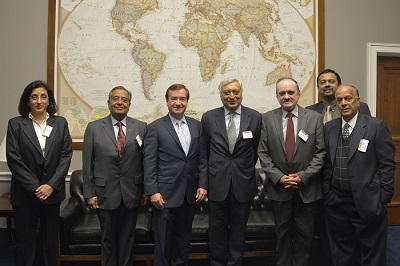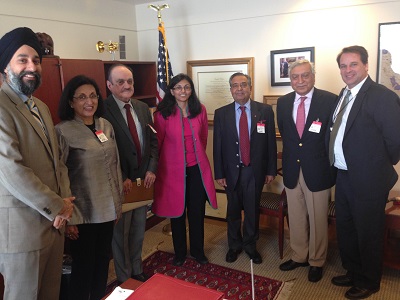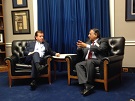A delegation from the VIF comprising Director, General NC Vij, Lt. Gen. Ravi Sawhney. Ambassador Kanwal Sibal and Dr. Harinder Sekhon visited Washington DC from November 3 to November 6, 2015. The VIF team was invited by the Atlantic Council and the Heritage Foundation for return conferences with which the VIF has MoU s and ongoing collaborations respectively on US-India bilateral relations and the Quad plus Dialogue.
The VIF delegation participated in various high-level meetings in Washington DC and met with Senators, Congressmen, senior US government officials and well-known members of the Indian Diaspora. The delegation was hosted to dinner by the Indian Ambassador,  Mr. Arun Kumar Singh to which leading members of the strategic community in Washington DC were also invited for an interaction with the visiting delegation. At the US Capitol, the VIF team had exclusive meetings with Senator John Cornyn, who is the co-Chair of the Senate India Caucus, along with Senator Mark Warner; Congressman Ed Royce, Chairman of the United States House Committee on Foreign Affairs; and Congressman George Holding, Representative for North Carolina’s 13th Congressional District who serves on the House Committee on Ways and Means.
Mr. Arun Kumar Singh to which leading members of the strategic community in Washington DC were also invited for an interaction with the visiting delegation. At the US Capitol, the VIF team had exclusive meetings with Senator John Cornyn, who is the co-Chair of the Senate India Caucus, along with Senator Mark Warner; Congressman Ed Royce, Chairman of the United States House Committee on Foreign Affairs; and Congressman George Holding, Representative for North Carolina’s 13th Congressional District who serves on the House Committee on Ways and Means.
At the VIF team met with Ms. Nisha Biswal, Assistant Secretary of State for South and Central Asia and her team of senior officers. The meeting originally scheduled for one hour, lasted for over one hour and twenty minutes. It was a very frank and informal discussion that covered various bilateral and regional issues including areas where our interests and views converge and matters where we disagree. It was very much the same when the visitors from New Delhi interacted with Dr. Peter Lavoy, Principle Deputy Assistant Secretary of Defense for Asian and Pacific Affairs and his senior staff at the US National Security Council office at the White House in Washington.
At the US State Department, At the Pentagon, the VIF delegation had a meeting with Mr. Keith Webster, Director, International Cooperation for the Under Secretary of Defense (USD) for Acquisition, Technology and Logistics (AT&L) and his team of officers that forms the India Rapid Reaction Cell at the Pentagon that focuses on the DTTI initiative of Secretary Ashton Carter. Another engagement was with Ms. Kelly Magsamen, Principal Deputy Assistant Secretary of Defense – South Asia Policy Division where regional security matters were discussed. Consultations were also held with Dr. Kurt Campbell, President of the Asia Group and former Assistant Secretary of State for East Asia, Dr. Ashley Tellis, Senior Associate at the Carnegie Endowment for international Peace, Ambassador Husain Haqqani and his team of scholars at the Hudson Institute.
The visiting group also interacted with about a dozen Senators and Congressmen at an evening reception at the US Capitol. Another evening reception was hosted in honour of the visitors at the Metropolitan Club in Washington DC to meet with the Indian Diaspora.
 On November 4, the Atlantic Council’s South Asia Center hosted a discussion on US-India bilateral relations which aimed at addressing the ways in which the US-India relationship can be sustained, and ultimately advanced to new levels.
On November 4, the Atlantic Council’s South Asia Center hosted a discussion on US-India bilateral relations which aimed at addressing the ways in which the US-India relationship can be sustained, and ultimately advanced to new levels.
The event featured a panel each on “Regional Security Challenges in Asia,” and “Prospects for US-India Defense and Economic Relations.” The sessions were bracketed by a special address from US Assistant Secretary of Commerce for Global Markets and Director General for the US and Foreign Commercial Service, H.E. Arun M. Kumar.
The first session, moderated by Dr. C. Christine Fair, Associate Professor at the Center for Peace and Security Studies at Georgetown University, featured The Hon. James B. Cunningham, Senior Fellow and Khalilzad Chair for the Atlantic Council’s South Asia Center; Lt. General R K Sawhney, Dean for the Centre for Defence Studies at VIF; and Amb. Kanwal Sibal, Dean for the Centre for International Relations and Diplomacy at VIF. While the panelists agreed that there are various areas on which the US and India should cooperate, the Indian and American counterparts presented different visions of how the international community should engage in India’s volatile neighborhood to bring stability. Although presenting different tactical visions of the security situations within this region, all panelists concurred that if Afghanistan implodes, “it won’t only be a problem for the region, but it will be a problem for the globe.”
 General N.C. Vij moderated the second panel on defense and economic relations which featured Sumona Guha, from the Policy Planning Staff of the US Department of State; Dr. Harinder Sekhon, Senior Fellow at VIF; and David Ryan, Executive Vice President and Americas Regional Head of Tata Communications. The panelists concluded that despite hiccups, economic development within India is solid and on an upward trajectory. The stated goal of increasing bilateral trade to $500 billion in the next decade reveals that there is significant untapped potential in India from which both countries can benefit.
General N.C. Vij moderated the second panel on defense and economic relations which featured Sumona Guha, from the Policy Planning Staff of the US Department of State; Dr. Harinder Sekhon, Senior Fellow at VIF; and David Ryan, Executive Vice President and Americas Regional Head of Tata Communications. The panelists concluded that despite hiccups, economic development within India is solid and on an upward trajectory. The stated goal of increasing bilateral trade to $500 billion in the next decade reveals that there is significant untapped potential in India from which both countries can benefit.
On November 5, the Heritage Foundation hosted the VIF delegation for a discussion on security challenges in East Asia and the theme was “The Quad: an Idea Whose Time has Come.” The panelists discussed how the Quad could cooperate in the future on a host of issues to include ensuring freedom of the seas, peaceful resolution of territorial claims, fighting terrorism, improving cyber security, and promoting free trade and commerce. VIF Director, General NC Vij spoke about the Strategic Landscape in the Asia-Pacific: Threats and Challenges in his keynote opening remarks. Ambassador Kanwal Sibal made a very incisive presentation on Enabling Tools of Cooperation among the Quad Plus Countries, Lt Gen. Sawhney spoke about the Role of the Quad in Countering the Threat of ISIS, Dr. Harinder Sekhon made an assessment about the Asia Pivot Strategy of the US – its successes and shortcomings, while Mr. Walter Lohman, Director, Asian Studies programme at the Heritage Foundation looked at the contribution made by Japan and Australia to the Quad. The discussion was moderated by Ms. Lisa Curtis, Senior Fellow at the Heritage Foundation.
The panel appreciated the role of each of the Quad countries in strengthening cooperation in this vitally important part of the world. U.S., India and Japan recently completed a six-day naval exercise in the Bay of Bengal that featured advanced naval submarines, guided missile cruisers, destroyers and frigates. The exercises followed the first-ever U.S.-Japan-India trilateral ministerial in New York in September 2015. Australian Defence Minister Kevin Andrews too said that his country was ready to participate in quadrilateral defence dialogue and naval drills with the other three countries. So the question arises, is it time to consider reviving the Quad in a more formal manner?
There was agreement amongst the panelists and other experts that while there is a congruence of interest among the Quad countries about the challenges that confront us in the Asia-Pacific, the real challenge for India and the United States is whether China will play a more positive, cooperative and responsible role.
An important takeaway from the visit was that while US-India relations are on a stable trajectory upwards, there remain irritants that hinder the relationship from reaching the next levels. These include US role and policies in India’s neighborhood, a lack of clarity on the China-Pakistan defense and economic ties, divergent Intellectual Property Rights standards between India and the US, and Foreign Direct Investment caps. The US and India must however continue to engage in an open dialogue to address these issues. If they carry on doing so, there is hope that this friendship can become the most significant partnership of the 21st century.






